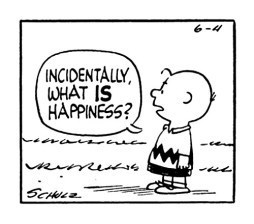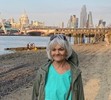Patsy Trench's Blog, page 14
March 18, 2013
Book reviews (and other things)
Over the months I’ve been sending my book off to various (mostly) family history publications for review, and having heard nothing from any of them since I decided to do some gentle nudging.
One replied saying they’d posted a ‘mini review’ a few months back, which turned out to be not so much a review as basic details about the book – slightly better than nothing I suppose. One said a review was about to appear in March, and another promised one in May. There was no response from the rest.
On the other hand there have been some lovely reviews on the Amazon sites from readers – most but not all of whom are personal friends of mine – which more than make up for it. If anyone reading this is one of those reviewers then please accept my heartfelt thanks. Those reviews mean an awful lot to me.
So, nine months since The Worst Country made its entrance into the world I’ve been doing some totting up, and some thinking.
At a rough estimate I have sold 109 copies of the book, in both ebook and print form – 99% or maybe 100% of them bought by friends and extended family.
To any regular publisher, and especially to an Amazon best seller, that figure is frankly laughable. At around £2 profit per copy I am now short of around £500 of my initial outlay, and that’s not taking into account the best part of the six years it took me to write and publish the book, plus the annual long-haul flights from the UK to Australia and other costs legitimately (are you reading this, HMRC?) incurred in the course of my researches.
From a practical point of view it gets more and more ridiculous. HOWEVER:
I do not feel despondent. I may be lacking in the marketing-skills department but what I do have is a book I am genuinely proud of; a book I had so many doubts about I thought I’d never have the nerve to actually publish. The response – admittedly from friends (though they can be your harshest critics) – has been so much more positive than I ever dreamed of. Those who witnessed my long journey will know how I struggled with the form and the intertwining of different styles, so to hear that this has worked, that readers have got what I was trying to say and, most importantly, describe it as ‘a good read’ is actually quite overwhelming.
~~~
Words to the self-published writer
Any writer will admit that to spend the bulk of one’s time making up stories (or in my case embellishing existing ones) in the expectation that people will pay to read them is pretty self-indulgent, and it takes guts to give yourself permission to do it in the first place. The journey into self publishing may be empowering but it is also intensely lonely. The writing business is a solitary one to begin with, but then not to able to include others in the process of bringing the book out is lonelier still. There is no one to affirm, encourage, advise or cajole you into not giving up. And the journey doesn’t stop with the writing and publishing, it continues on and on and on, for as long as you have the energy to drive the thing forward. This is why those Amazon reviews mean so much.

The long and lonely road …
‘Do it because you love it’ may sound like banal advice, and I’m not saying I wouldn’t half mind making a living out of writing, but actually folks, it’s the best advice. If you can end up with something you are even half proud of, if you can surprise yourself with what you find yourself capable of producing, you are on the road to happiness, even if there are long, lonely, dark stretches on the way.
~~~
All that said it may seem ludicrous and irresponsible – lacking either a livable income or a sugar daddy – to be contemplating writing the sequel to Worst Country, focusing this time on my great great grandfather GM Pitt, Mary’s grandson, who married the daughter of convicts and went off to the remote parts of NSW to become a farmer before founding the stock and station agent Pitt, Son & Badgery.
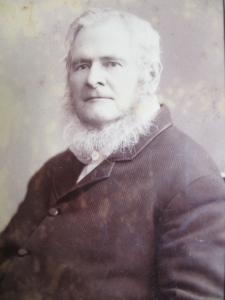
G M Pitt
And I’m going to have to be pretty ingenious to find a way of funding it. Watch this space.


March 14, 2013
God’s own country
It was a phrase originally coined to describe New Zealand, but it could equally apply to Australia.
In England we talk about the weather but here, where everything from the country itself to the milk you buy in the supermarkets is Big, they talk about the climate.

Scarborough beach, WA
To go from the blazing, dry, 40 degree heat of Perth in February – where the sun shines out of a clear blue sky so consistently people gasp when they spot a cloud; where the beaches go on forever and if there is any poverty (which there undoubtedly is) it’s well hidden; to the unpredictability of Sydney, where it can go from 40 degrees to 20 in half an hour, and where the Prime Minister has recently been visiting a suburb called Rooty Hill in order to fraternise with ordinary people as (not) part of an extended election campaign; where earlier this year huge swathes of southern NSW suffered bush fires; to northern New South Wales where the main (and only) highway was until recently under flood and where it has rained virtually every day for weeks; to an island off the coast of Queensland where people live in paradise and commute to Brisbane; to the nation’s capital Canberra, celebrating its 100th birthday and currently too hot to walk about in – is to visit several countries in one continent.

Beach sculpture on Coochiemudlo Island.

Farmland in northern NSW, posing as Wales.
But one thing seems consistent: everyone is supremely proud of where they live. And while yes, Australia has become one of the most expensive countries in the world, thanks to the healthy dollar, the sun does shine and boy does it make a difference. Driving south along the Pacific Highway towards Sydney, where the road has not just been hacked but sculpted out of the rocks (as my cousin put it) and across the glorious Hawkesbury River – my home-from-home – is unforgettable.
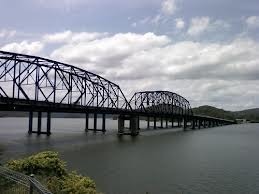
Brooklyn Bridge (panoramio.com)
When it comes to public transport however the car-less visitor is challenged. One hundred year-old Canberra, which is expanding even as you look, was constructed without any kind of metropolitan railway at all. And my bus and train journey from there to Wagga Wagga (to visit my brother and sister in law) yesterday, which is around a two and a half hour journey by car, took me six, on account of the Sydney to Melbourne train running ninety minutes late – something to do with ‘problems getting out of Sydney’. (Most surprisingly, no one made much of a fuss. They’re used to it, says my bro.)
It’s enough to make a person nostalgic for London Transport.
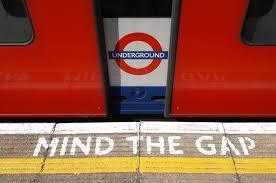
tfl.gov.uk
February 1, 2013
The pursuit of happiness
Looking for happiness is a bit like looking for your glasses: the harder you hunt the more elusive they become, and in the end they invariably turn out to be on top of your head, or on a string strung around your neck – ie closer than you thought.
In the aftermath of the Olympics and Paralympics last year when people were raving on about the Olympic spirit and how we could retain it, I wrote to the Guardian with a couple of suggestions: that the volunteers greeting and guiding people in central London be kept on (I’d have happily been one of them), and that all references to the economy be kept off the headlines in the media for at least six months, if not forever.
I cannot remember a time when the economy dominated our lives as it does now. The news is always bad, and worse, not only do .000001% of the population have the smallest understanding of what’s going on (which may or may not include our Chancellor of the Exchequer), there isn’t a thing anyone of us can do about it: two reasons to plunge us all into gloom. For those who are genuinely suffering – the unemployed, homeless and sick – this is the last thing they need. For the rest, those who have jobs and homes, it’s almost impossible not to immediately start worrying about the security of those jobs and homes.
(That said, if you’ve ever tried to find somewhere to eat in the West End on a night, any night, you might ask yourself – ‘Triple-dip recession? What triple-dip recession?’)
And then … SOLT, the Society of London Theatre, announced earlier this week that last year was the best year ever for West End theatre: audiences up, takings up. In other words, a SUCCESS STORY.
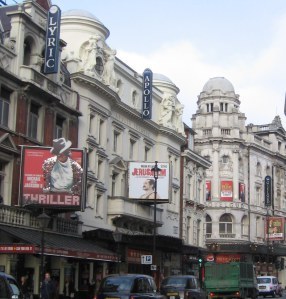
Shaftesbury Avenue (londontheatrevisits.com)
This is my point: our economy may be going down the pan but our ARTS are THRIVING. I know it’s not all rosy, regional theatres are suffering and some are closing because of withdrawn subsidies. What I am struggling to say is at a time when the arts are apparently (yet again) being sidelined in schools, despite the economy the theatre business is booming. You try getting a ticket for Di and Viv and Rose at Hampstead Theatre, or for The (ex Hampstead Theatre) Judas Kiss at the Duke of York’s – directed by an Australian by the way – or Quartermain’s Terms with Rowan Atkinson, or Curious Incident, The Audience the list goes on.
HAPPINESS IS HERE, right in front of us. We just have to know where to look.
Talking of which:
Once again, for me, it’s the ‘What am I doing this for?‘ time of the year. When I pack up my flat in chilly north London and head east, this time for Singapore, where an old friend has emerged, and on to Australia again where I may or may not get to work on the sequel to The Worst Country in the World (working title The Definitely Getting Better Country ..) Last year I called up my UK bank and asked them to transfer some £££ into my AU$ account in Sydney and was a tad taken aback to hear the exchange rate was in the region of $1.4 to the £. (In times past it was always at least $2 = £.) This year I’ve become cannier. I hunt around for the best deals – I spend hours hunting around for the best currency exchange deals on the web and contemplate travelling some distance in order to get them. Now that I know ordering online and collecting gets you much better rates I have to do it, but it’s a drag, frankly.
Yes, Australia is expensive. But money is not the essence of happiness, as we all know. (And ignorance can be bliss.)

and sunshine definitely helps …


December 19, 2012
What if …
… Jean-François de Galaup, Comte de La Pérouse, had arrived at Botany Bay a few days before he did?
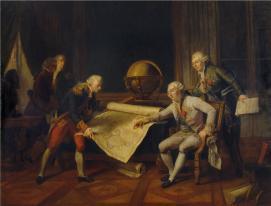
La Perouse with King Louis XV! (ngv.vic.gov.au)
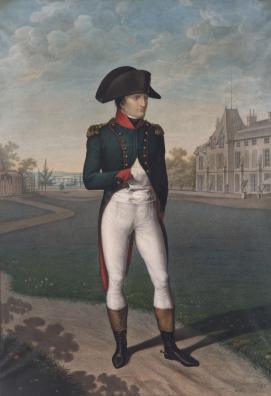
Napoleon Buonaparte (ngv.vic.gov.au)
What if ….
Napoleon Buonaparte had been born a few years earlier?
The country we now know as Australia may have become L’Australie, and the Napoleonic Wars may never have happened.
***
On 26 January 1788, the day Captain Phillip arrived at Port Jackson and planted the British flag into the soil on behalf of His Majesty King George III of England, two French ships, commanded by Comte de La Pérouse, arrived at Botany Bay.
La Pérouse had been appointed by King Louis XVI in 1785 to explore the Pacific Ocean in order to look for new shipping routes and trading opportunities, and check out what other Europeans might be up to in the region. One sixteen-year-old lad from Corsica asked to be taken on but was turned down because of his age. His name was Napoleon Buonaparte.
The French hung around Botany Bay for six weeks, and in mid March they sailed north on their way eventually back to France.
They never arrived. Years later the wrecks of their ships were discovered near the Solomon Islands.
Had Napoleon been on board …
Had La Pérouse and his fleet arrived just a week earlier …
***
What other ‘What ifs’ might there have been in history?


December 10, 2012
Best sellers
I cannot be the only one who reads books quite differently on an e-reader and in paperback.
The problem with an ebook is it’s too easy, the moment you get slightly bored, to switch to something else. It only takes two clicks. With print on the other hand you may have to wait until you are physically within reach of a replacement before you can put down book number one in order to pick up book number two. This may account for why I currently have at least four books on my Kindle that I am not even half way through.
With this in mind I glanced at the best-selling lists for ebook (Kindle) and print, in the UK, right now, to see if there were any similarities. The results are below:
Kindle (currently on my device 10/12/12)
Safe House, Chris Ewan
You Had Me at Hello, Mhairi McFarlane
Thursdays in the Park, Hilary Boyd
1,227 QI Facts to Blow Your Socks Off, John Lloyd, John Mitchinson
The Shoestring Club, Sarah Webb
Life of Pi, Yann Martel
Three Women of Liverpool, Helen Forrester
The Expats, Chris Pavone
The Secret Keeper, Kate Morton
The Lewis Man, by Peter May
Print (paperback fiction, Guardian 8/12/12)
Seven Years to Sin, Sylvia Day
The Woman who Went to Bed for a Year, Sue Townsend
Siege, Simon Kernick
Jack Reache, Lee Child
Reflected in You, Sylvia Day
Fifty Shades of Grey, EL James
The Drop, Michael Connelly
The Key, Simon Toyne
A Half-forgotten Song, Katherine Webb
A Sixpenny Christmas, Katie Flynne
Analysis: your guess is as good as mine, but there is not one book that appears on both lists. With the obvious exceptions of numbers 4 and 6 (and 3, which I just read) on the Kindle list I haven’t heard of any of the books or their authors, whereas while I haven’t read any on the paperback list I’ve certainly heard of at least half of the writers, if not the books themselves. (This shows up how badly-read I am, I admit it. Who is Sylvia Day??)
Of the Kindle books five of them are priced at 20p and the most expensive, Three Women, is currently £5.49. Now I know it may be perverse and enough people have told me the price of an ebook does not reflect its quality, but if I was tempted to buy any of those I’d go for Three Women, partly because the 20p idea (I believe) was Amazon’s retort to Sony but also because it’s all too easy to download your 20p book with only the faintest intention of reading it, plus at 20p the writer would have to sell a squillion copies to make any money at all, but mostly because 20p is frankly a ridiculous price and – again despite received opinion and at the risk of sounding pompous – it devalues the writer’s work and in the long run risks turning the business of writing into a hobby. I mean that quite seriously.
**********
Amazon is currently in the doghouse – along with other big cats like Google (if a cat is allowed in a doghouse) – here in the UK because of tax avoidance. That’s the legitimate way of not paying any more tax than you are legally obliged to pay, which our politicians, who created the laws that these big companies are abiding by, are now calling immoral.

The cat in the doghouse (flickr)
There are calls to boycott companies who avoid tax and while I’m all for that when it comes to Starbucks (not a problem, not at all), with Amazon and Google it’s another matter. What we perhaps should be more wary of, which they are all too aware of, is the power of the monopoly these big players enjoy. I could possibly not buy through Amazon for a while, though it would be difficult, but I could not live without Amazon. Without Amazon, one way or another, I have no book. Amazon has revolutionised the book publishing world, not always for the better perhaps, but it’s through Amazon alone that I’ve been able to produce both my ebook and the print version of The Worst Country in the World, the latter of which costs me all of US$4.73 per copy (plus shipping), which is pretty darn remarkable.
So thank you Amazon, I am endlessly grateful to you, but it would make my life and the lives of many many others so much easier, not to say what it would do to your reputation – which does matter – if you could be seen to be giving something back. If not through tax loopholes through arts sponsorship at least.
December 5, 2012
Bookshops
I took me a ridiculously long time to summon the courage to brave the independent bookshops to ask if they would consider stocking my book. I struck lucky right away with my first visit to Queen’s Park Books in Salusbury Road – Lisa behind the counter is an Aussie and she leapt on my book like a long lost friend and ordered three copies. The next visit was not quite so productive but while I was on my way home and partly patting myself on the back it occurred to me that at a 75%/35% split I would be getting back less than I paid for them. Fortunately that misconception lasted only 24 hours till I went back to be reassured it was 75% to me and 35% to the shop. (And they had already sold one copy.) So did I feel a right idiot or what?
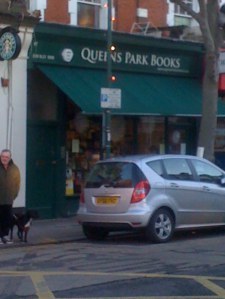
Queen’s Park Books, Salusbury Road NW6
In an attempt to look vaguely professional I compiled a press release containing my contact details, a rough idea of the nature of the book and its potential readership, and a few bits and pieces about me. The result for anyone who is interested ended up looking like this: Press release 2





